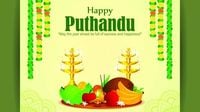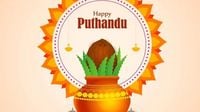Puthandu, also known as Tamil New Year, is set to be celebrated on April 14, 2025, marking the first day of the Tamil month Chithirai. This significant festival is not just a local celebration but is recognized by Tamil communities worldwide, including in countries like Sri Lanka, Malaysia, and Singapore. The day is steeped in tradition and cultural significance, symbolizing new beginnings, hope, and prosperity.
According to Drik Panchang, the Sankranti moment for Puthandu will occur at 3:30 AM on April 14. This moment is crucial as it determines the exact timing of the new year celebrations. In Tamil Nadu, if Sankranti occurs after sunrise and before sunset, the year begins on the same day; if it happens after sunset, the new year is celebrated the following day. This year, the timing aligns perfectly for a celebration on April 14.
The festival of Puthandu is celebrated with various rituals and customs. On the eve of Puthandu, families prepare a special tray known as the "Kanni," which includes auspicious items such as mangoes, bananas, jackfruits, betel leaves, areca nuts, flowers, and even gold or silver jewelry. Viewing this tray first thing in the morning is believed to bring good fortune and prosperity for the year ahead.
As part of the celebrations, people engage in thorough cleaning and decorating their homes with colorful kolams (traditional rangoli designs). This cleaning symbolizes the removal of negativity and the welcoming of positive energy into their homes. Many also take a special herbal bath, often incorporating turmeric, to cleanse themselves physically and spiritually.
Food plays a central role in the celebrations of Puthandu. Families prepare a variety of traditional dishes, with "Mangai Pachadi" being a highlight. This dish is made from raw mango, jaggery, sambar powder, and betel leaves, symbolizing the mix of sweet and sour flavors that life brings. Other popular dishes include vadai, sambhar, rice, payasam, vegetable curry, and fresh mango pickle. Such feasting represents the spirit of togetherness and sharing among family and friends.
Puthandu is not only a time for celebration but also a moment for reflection and renewal. It encourages individuals to set new goals and embrace the future with optimism. The festival's significance is deeply rooted in the agricultural calendar, marking the beginning of the harvest season. Historically, it has its origins in the Sangam period, a time when ancient Tamils celebrated the arrival of spring and the start of agricultural activities.
As the Tamil New Year approaches, families also visit temples to offer prayers and seek blessings from their deities. This religious aspect of the festival reinforces the importance of spirituality and gratitude in the lives of the Tamil people. Elders often bless younger family members, further strengthening familial bonds.
In Tamil Nadu, Puthandu is also known as Varsha Pirappu, which literally translates to 'New Year' in Tamil. The day is believed to reflect balance and harmony, as it coincides with the equinox when day and night are of equal length. This balance is seen as an ideal start to the year, promoting peace and prosperity in life.
The celebration of Puthandu is also marked by various wishes and greetings exchanged among family and friends. Common phrases include "Puthandu Vazthukal," which translates to "Happy New Year." These greetings express hopes for a year filled with joy, prosperity, and success.
As the festivities unfold, the Tamil community comes together in a vibrant display of culture and tradition. The colorful kolams, the aroma of traditional dishes, and the sounds of laughter and joy fill the air, creating a sense of unity and celebration. Whether in Tamil Nadu or among the Tamil diaspora around the world, Puthandu is a cherished occasion that brings people together to honor their heritage and celebrate the promise of a new year.
In conclusion, Puthandu is more than just a new year celebration; it is a reflection of the rich cultural tapestry of the Tamil community. With its blend of rituals, food, and family gatherings, it encapsulates the essence of hope and renewal, making it a significant event in the lives of many.









